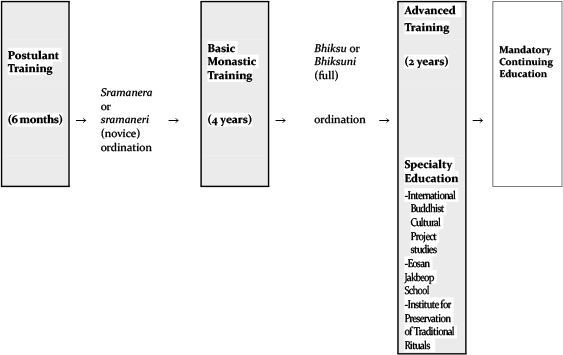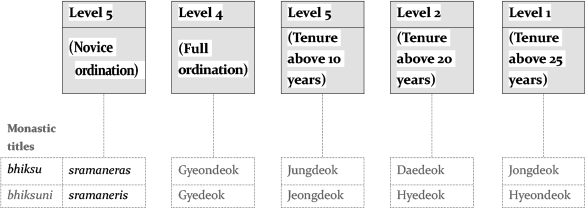대한불교조계종 출가
Ordination for foreigners
Who is subject to the process for the ordination of foreigners?
- Anyone who does not have Korean citizenship, both foreigners and overseas KoreansQualification
- High school or equivalent completed
- Marital status: unmarried (single or divorced)
- If you are divorced, a minimum of six months should pass before admitted to the Precept Training Program
- If you have minor children, your parental rights should be relinquished before joining the Jogye Order. - Should be mentally and physically fit to serve and practice while living communally.
Required documents
- ① Postulant Registration Application Form (Use the same application form for Koreans)
- ② Cover Letter (Use the same cover letter form for Koreans)
- ③ Certificate of Marriage
- ④ Certificate of Family Relations (in case of having minor children, please provide separate certificates for them.)
- ⑤ Diploma for the highest degree earned
- ⑥ Background Check (Criminal Records) Certificate(Do not submit until further instructions are provided.)
- ⑦ Copy of your passport
- ⑧ Certificate of Alien Registration
- * ③, ④, ⑤, ⑥ to be translated into Korean and notarized
Training Programs
Once the postulant application is accepted and registered with the Education Bureau, all postulants must stay at least six months and receive requisite postulant training programs at their respective temples or relevant headquarter temples as prescribed by the Jogye Order of Korean Buddhism to be qualified to apply for the sramanera or sramaneri (novice monk and nun) ordination.First, the postulant training programs consist of: the Basic Training, the Introductory Training, and the Precept Training. While the postulants receive the Basic Training at the temples where they first join, the last two Training Programs are conducted by the Education Bureau. These programs are designed to deepen their faith and help them adjust to life at the temple and form new worldviews.
Second, the postulants receive the Basic Training as they go about their lives at the temple as new initiates. They learn the most essential Buddhist rituals, doctrines, chanting, and the code of conduct applicable to the monastics.
Third, all postulants are required to take the Introductory Training organized by the Education Bureau, a 5-day course on temple etiquettes, life in monastic Sangha, Buddhist rituals, and ceremonies.
Fourth, the Precept Training is the last step required of the postulants before they are qualified to receive the sramanera or sramaneri (novice monk or nun) ordination. At the end of the 12-day course, during which the postulants learn the sramanera or sramaneri precepts they will take, the postulants take the Level 5 Monastic Qualification Exam.
The Introductory and Precept Training Programs are mandatory for all postulants and offered at a venue designated by the Education Bureau, which is also responsible for providing curriculums. The temples should make sure that their postulants will receive the relevant information posted by the Education Bureau about the training and arrive at the training venue in time.
* All foreign postulants must pass TOPIK (Test of Proficiency in Korean) Level 1 to be qualified to apply for sramanera or sramaneri ordination.
Life after Ordination
Ordination is a great leap forward on the path of fulfilling the vow to help all beings to realize the Buddha within and live the life embodying the wisdom and compassion of the Buddha.
To familiarize all applicants with the life after monastic ordination and motivate them to be reborn as practitioners with ardent faith and vows, this chapter provides information on the Monastic Educational System, Monastic Qualification Exams, and the Monastic Titles and Statuses.
Monastic Educational System

The monastic training and education provided by the Jogye Order of Korean Buddhism are designed to develop an ordained Sangha dedicated to helping all sentient beings to attain enlightenment and realize the Buddha Land on this very earth under the Jogye Order’s banner of transmitting Buddha-dharma and saving all beings.
Those who take sramanera or sramaneri (novice monks and nuns) precepts will go on to receive the Basic Monastic Training at designated institutions and continue their education on Buddhism. Once fully ordained, monastics can further their training by choosing specialties. The ordination process may be rigorous, but once fulfilled, it is quite rewarding.
□ Postulant Training
Once a new initiate applies for a postulant position at a temple and is accepted, the temple registers him or her as a postulant with the Jogye Order. Once registered, the postulant is required to stay and be trained for at least 6 months at the temple they joined and must attend the 5-day course to finish the Introductory Training organized by the Jogye Order within 1~2 months of the initiation. After 6 months, postulants can attend the Precept Training (2~3 weeks) after which they are qualified to take sramanera or sramaneri (novice monk or nun) precepts.□ Basic Monastic Training
Once ordained as novices, they enter one of the institutions accredited by the Jogye Order to provide the Basic Monastic Training (Sangha Universities, Buddhist seminaries, Dongguk University, Basic Seon Center) and spend 4 years to learn Chinese Buddhist texts, early Buddhism, Mahayana Buddhism, precepts, Buddhist history, Seon Buddhism and languages. They take part in all dawn and evening services, prayers, rituals, and ceremonies organized by hosting institutions. They also serve the Sangha by performing various tasks. Once they graduate and pass the Level 4 Monastic Qualification Exam, they become bhiksu or bhiksuni (fully ordained Buddhist monks and nuns).
* Institutions providing the Basic Monastic Training
1. Central Sangha University: Recognized by the Korean government as a university-level tertiary educational institute, Central Sangha Univery provides the Basic Monastic Training to sramaneras or sramaneris, who are required to live in dormitories on campus. Located in Gimpo, Gyeonggi-do province, Central Sangha University teaches the Sangha rules of communal life, Buddhist studies, and other related academic disciplines.
2. Buddhist temple seminaries: There are a total of 18 Buddhist seminaries at 18 temples across the nation (12 for sramaneras and 6 for sramaneris). Sramaneras and sramaneris, or the novice Buddhist monks and nuns, are trained on the Sangha rules of communal life and the Buddhist doctrines in a more traditional temple environment.
3. Dongguk University: 40 novice monks and nuns are admitted every year, to be placed either in Dongguk University’s Seoul or Gyeongju Campus, through the document screening and interview process. CSAT (College Scholastic Ability Test) score is not required. All 40 of them will receive scholarships covering a minimum of 70% of the tuition. While earning an academic degree in Buddhist studies, they live in 4 designated dormitories and learn the Sangha rules of communal life.
1. Central Sangha University: Recognized by the Korean government as a university-level tertiary educational institute, Central Sangha Univery provides the Basic Monastic Training to sramaneras or sramaneris, who are required to live in dormitories on campus. Located in Gimpo, Gyeonggi-do province, Central Sangha University teaches the Sangha rules of communal life, Buddhist studies, and other related academic disciplines.
2. Buddhist temple seminaries: There are a total of 18 Buddhist seminaries at 18 temples across the nation (12 for sramaneras and 6 for sramaneris). Sramaneras and sramaneris, or the novice Buddhist monks and nuns, are trained on the Sangha rules of communal life and the Buddhist doctrines in a more traditional temple environment.
3. Dongguk University: 40 novice monks and nuns are admitted every year, to be placed either in Dongguk University’s Seoul or Gyeongju Campus, through the document screening and interview process. CSAT (College Scholastic Ability Test) score is not required. All 40 of them will receive scholarships covering a minimum of 70% of the tuition. While earning an academic degree in Buddhist studies, they live in 4 designated dormitories and learn the Sangha rules of communal life.
□ Advanced Training
Fully ordained Buddhist monks and nuns can further their study on Buddhist doctrines at Sangha graduate schools and specialized in Seon Buddhism, precept, sutra, or early Buddhist studies. The Sangha graduate programs consist of 2-year degree courses and 3-year research programs.
* Scholarships for monastics
Under the Ordinance Regarding the Payment and Management of Monastic Scholarships, the Jogye Order is providing scholarships to the monks and nuns who are admitted or consider applying to graduate programs in Korea and other countries. Once qualified for monastic scholarships, candidates continue to receive financial support until they finish and graduate from the graduate schools of their choice.
Under the Ordinance Regarding the Payment and Management of Monastic Scholarships, the Jogye Order is providing scholarships to the monks and nuns who are admitted or consider applying to graduate programs in Korea and other countries. Once qualified for monastic scholarships, candidates continue to receive financial support until they finish and graduate from the graduate schools of their choice.
□ Specialty Education
Once fully ordained, Buddhist monks and nuns can choose to go into specialty fields such as Buddhist literature, arts, music (modern or beompae), architecture, mass media (newspaper and broadcasting) as well as film making as means to further the objective of Dharma propagation. The Jogye Order affiliated universities offer a major in international Buddhist cultural project studies, and it also operates Eosan Jakbeop School and the Institute for Preservation of Traditional Rituals for Specialty Education.□ Mandatory Continuing Education
Fully ordained monks and nuns must continue to attend various training and educational courses on spiritual practices, spiritual leadership, doctrinal studies, and Dharma dissemination to maintain their monastic qualifications and rise in the monastic hierarchy.Path of Freedom and Compassion
The Monastic Titles and Statuses represent the degrees in the maturity of spiritual leadership and practice and form the foundation of the seniority in the monastic order. Fully ordained monks and nuns are required to take the Monastic Qualification Exames at recommended intervals.
○ According to Article 2 of the By-laws for the Monastic Titles and Statuses, the Monastic Titles and Statuses “represent the degrees in the maturity of spiritual leadership and practice and form the foundation of the seniority in the monastic order.” There are 4 Levels in the Monastic Qualification Exams.
○ As the monks and nuns satisfy tenure and training requirements, they gain the right to take each Level of the Monastic Qualification Exam, and if they pass, they are entitled to the relevant Monastic Titles and Statuses. Please see below for more detailed information.
Monastic Qualification Exams

Buddhist monks and nuns play an important role as spiritual leaders in society and serve as an example that the congregation aspires to follow. They must fulfill the duties their callings as spiritual practitioners and Dharma propagators entail, to save all beings and establish the Pure Buddha Land on this earth.
□ Duty to practice
Ordained monastics must practice meditation, chanting, sutra copy, or mantra reciting to attain enlightenment and save all beings by upholding the Buddha’s and patriarchs’ lineage.□ Duty to propagate Dharma
Ordained monastics are obliged to engage in Dharma propagation through missionary and volunteer works as well as social welfare projects to realize the Buddha’s wisdom and compassion in this world.□ Duty to relieve suffering
Being ordained means that they vow to the Bodhisattva Path, which is essential to their practice. It is their sworn duty to relieve the suffering of the poor and diseased and help alleviate social ills.
